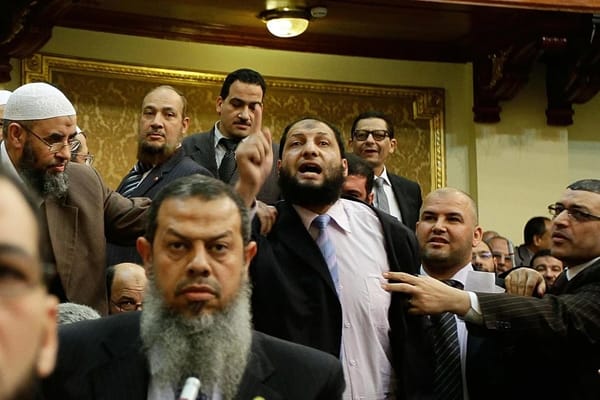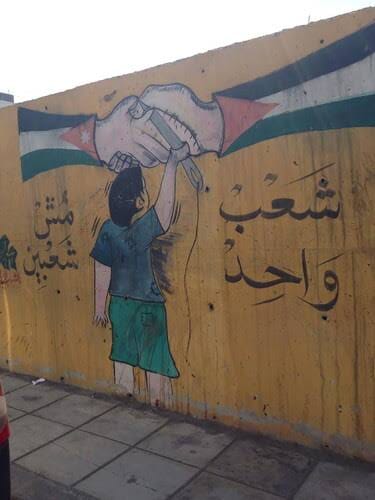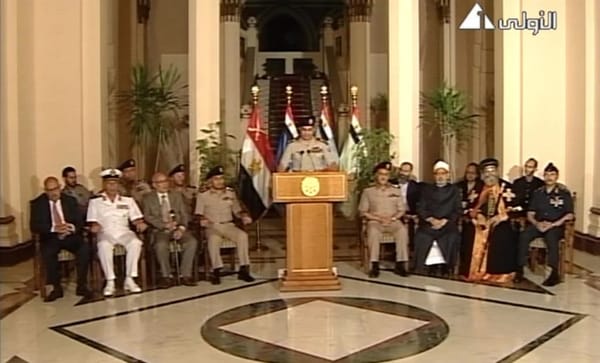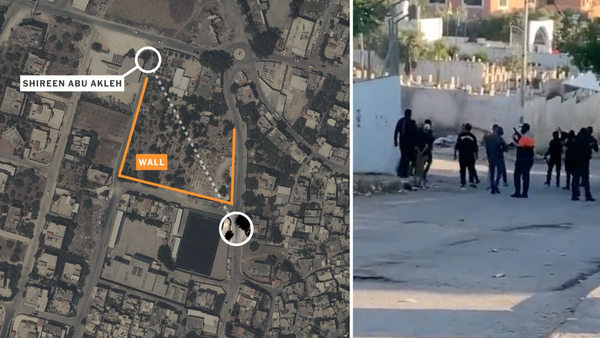Decentralization in the Middle East
This week's roundup from the MENA Academy, amidst another barrage of terrible news.
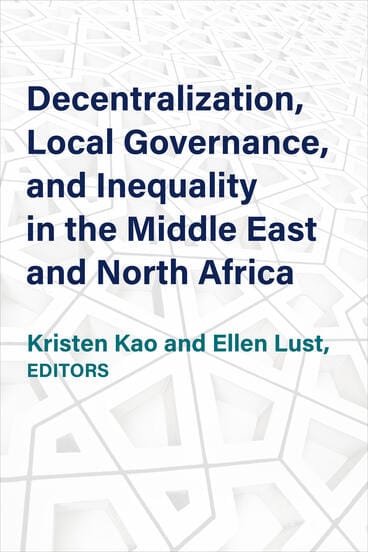
Today is the day to catch up with the latest research published in the MENA Academy. But first, a few new appalling developments from the omnicrisis:
- First, the WSJ is reporting that Columbia is preparing to capitulate to the Trump administration’s extortion and agree to all of its demands, including placing the Middle East, South Asia and Africa Studies Department under academic receivership by one name or another, effectively ending the academic independence and scholarly integrity of what used to be one of America’s leading universities and inviting Trump to do the same to every other institution which fails to bend the knee.
- Second, Le Monde reports the denial of entry of a French scientist coming to the US to attend an academic conference over messages found on his laptop criticizing Trump. That’s the sort of thing which we used to face when trying to visit Israel or the worst authoritarian regimes in the region, and it’s the sort of thing which could doom academic conferences in the US for a long time (see this absolutely excellent Paul Musgrave post for more). A number of universities, including most recently MIT, have issued travel guidance for noncitizen students and faculty. Personally, I have canceled several international trips in the coming months, will be holding the POMEPS annual conference online, and won’t be going to APSA in Vancouver (though that’s as much because of how utterly worthless the American Political Science Association has been in the face of this attack on academia, with only two statements issued in all of 2025 and none addressing the heart of the matter). I do not think that any academic (certainly any from the MENA region) should try to come to the US under these conditions, and don’t think that any noncitizen in the US should risk leaving the country right now for fear of being denied reentry.
- Third, masked ICE agents straight up kidnapped a Georgetown graduate student instructor, Badar Khan Suri, from outside his home and revoked his student visa not because of anything he had done but because his wife — an American citizen — had been identified as the daughter of a Hamas advisor in the kinds of extreme right wing fever swamps outlets that now apparently determine US policy. The US wants to deport him, like Mahmoud Khalil, on the say so of Marco Rubio, who is now apparently empowered to deport anyone he thinks harms US foreign policy interests without trial, evidence, or appeal. Being snatched in the street by masked security officers and deported because of suspected political views, needless to say, is appalling and should be getting a lot more attention than it seems to be.
- Fourth, Trump is reportedly set to issue an EO shutting down the Department of Education. He can’t legally do that, of course, but that hardly seems to matter anymore. It would throw the entire educational sector, from K-12 through higher ed, into chaos — financial aid, accreditation, special education, and so much more — but stripping away state capacity and wrecking the country continues to be the lodestar for the administration. I wonder if they’ve even thought about how ending the DOE would impact Title VI (the basis for the antisemitism investigations they claim to care so much about) and Title IX (the foundation for women's sports, which they pretend to care so much about).
- Fifth, I was absolutely stunned yesterday when a judge refused to grant USIP a temporary restraining order despite the situation seeming to absolutely clear: DOGE forced its way in to an independent institution which is explicitly not part of the executive branch and owns its own building, after Trump purported to replace the president and board without following any of the insitution’s bylaws, and immediately proceeded to rip down its signs, shred its documents, and end its programming. The only thing a judge should be doing in this situation is sentencing the trespassers to long prison terms, but instead she just allowed the vandalism to continue — with implications for every other non-governmental institution in the country.
But even amidst the chaos and despair, MENA political scientists continue to do great work. This week’s MENA Academy roundup begins with Decentralization, Local Governance and Inequality in the Middle East an North Africa, a wonderful new volume edited by Kristen Kao and Ellen Lust and published open access in the great new Emerging Democracies series by the University of Michigan. The volume brings together a superb collection of mostly younger scholars doing intensive field research on local politics across the region. The overarching premise (in line with the chapter on local politics in our book The Political Science of the Middle East) is that MENA political science has overly focused on politics at the center — capital cities, elites, national institutions — and neglected the peripheries, and that this neglect has led to serious misunderstandings of the dynamics of governance, inequality, gender, representation and power.
The Middle East literature, they argue, has lagged behind the rest of the field of political science in shifting attention to the local level, including both rural and mountainous areas which have traditionally defied state penetration and municipal level politics. The chapters in the volume make a strong case that the local level matters, with significant variation in political outcomes based on local political, social, and institutional characteristics. That’s true even in the most autocratic regimes, as Alissa Walter’s book on Baghdad that we discussed last week clearly showed. This volume focuses on four cases — Lebanon, Morocco, Syria and Tunisia — while drawing much broader conclusions. Middle Eastern states have generally resisted real decentralization, with most formal decentralization initiatives aimed more at implementing demands from the center than at genuinely empowering local officials. But, the book argues, the Arab uprisings in particular demonstrated the importance of the periphery and highlighted the profound alienation from the center felt by so many citizens across the region.
I hosted Kao and Lust on this week’s Middle East Political Science podcast. Listen to our conversation here:
The MENA Academy: Around the Journals
It’s been a couple of weeks since I last rounded up new articles published in academic journals. So there’s a lot to catch up on! In this week’s roundup, we begin with two important articles on Kuwait: Daniel Tavana on the contours of Kuwait’s parliamentary opposition, and Fiorella Rabuffetti and Emily Regan Wills on citizenship and the Bidoon. We then present two articles on violence and politics: Casey Crisman-Cox and Michael Gibilisco on the dynamics of violence and outbidding between Fatah and Hamas, and Gabriel Garroum Pla on urban reconstruction in Asad’s Syria. Next, we look at four articles focused on dimensions of the public sphere: Shabnam Holliday and Edward Wastnidge on Mohammed Khatami’s Dialogue of Civilizations initiative through the lens of Global IR (something I wrote about, gulp, twenty five years ago and yes I feel old); Burçe Çelik on subaltern publics in the Middle East; Bilge Yabanci on youth camps in Turkey as a form of political indoctrination and education; and Maria Nicola Stragapede on silence and mobilization among left-wing Tunisian youth. Finally, there are new issues out of Middle East Policy and Middle East Report full of relevant articles.
Daniel Tavana, “Endogenous opposition: Identity and ideology in Kuwaiti electoral politics,” American Journal of Political Science (March 2025). ABSTRACT: How do opposition elites succeed in authoritarian elections? Existing theories of authoritarian politics suggest a pivotal role for elections in enhancing the survival of incumbent dictators. Yet, in many contexts, opposition elites attract considerable support and constrain the policymaking authorities of these dictators. This article presents a theory of endogenous opposition that traces the electoral success of opposition elites to the strategic use of symbolic ideological appeals, or campaign appeals that cast politicians as allies of particular ideological movements. I present quantitative and qualitative evidence in support of my argument from Kuwait. I show that minority elites who use symbolic ideological appeals are more likely to capture voters from other minority groups. Once elected, these legislators are more likely to oppose the ruling family in the legislature. These findings challenge existing theories of authoritarian politics and point to ideology as an understudied source of opposition success in authoritarian elections.
Fiorella Rabuffetti and Emily Regan Wills, “The problem with the Comoros solution: affect, citizenship, statelessness and the Kuwaiti Bidoon,” Citizenship Studies (March 2025). ABSTRACT: The Kuwaiti bidoon are a subset of the nomadic population of Kuwait who have been made stateless, classified as illegal residents and increasingly deprived of social rights through changing classifications by the Kuwaiti government. In 2014, the Kuwaiti government attempted to obtain citizenship in the African island nation of the Comoros for the bidoon, which would have provided them with a route to legal residency. But would this have provided a just resolution to the bidoon‘s situation? We argue that justice for the bidoon must not simply serve to resolve their de jure statelessness; it must, instead, attend to the injuries produced by this status, most importantly the harm caused by continuous rejection of their affective attachment to Kuwait. In dialogue with theories of access to citizenship and political identification with a state, we argue that under certain circumstances, providing citizenship can increase the harm experienced by stateless people, and that only providing recognition of their affective tie to a political community can resolve it.
Casey Crisman-Cox and Michael Gibilisco, “Tug of War: The Heterogeneous Effects of Outbidding Between Terrorist Groups,” International Organization (March 2025). ABSTRACT: We introduce a dynamic game of outbidding where two groups use violence to compete in a tug-of-war fashion for evolving public support. We fit the model to the canonical outbidding rivalry between Hamas and Fatah using newly collected data on Palestinian public support for these groups. Competition has heterogeneous effects, and we demonstrate that intergroup competition can discourage violence. Competition from Hamas leads Fatah to use more terrorism than it would in a world where Hamas abstains from terrorism, but competition from Fatah can lead Hamas to attack less than it otherwise would. Likewise, making Hamas more capable or interested in competing increases overall violence, but making Fatah more capable or interested discourages violence on both sides. These discouragement effects of competition on violence emerge through an asymmetric contest, in which we find that Fatah uses terrorism more effectively to boost its support, although Hamas has lower attack costs. Expanding on these results, we demonstrate that outbidding theory is consistent with a positive, negative, or null relationship between measures of violence and incentives to compete.
Gabriel Garroum Pla, “Spatial Entanglements of (In)Security and Violence: Exploring the Politics of Syria’s Urban Reconstruction under Asad,” The International Spectator (March 2025). ABSTRACT: An examination of the politics of reconstruction under Asad sheds light on how the Syrian regime’s efforts to establish a new sociopolitical order were deeply intertwined with the spatialisation of (in)security and the (in)securitisation of urban spaces. Drawing on approaches from the emerging ‘Beirut School’ of Critical Security Studies (CSS) that foreground the role of violence and its impact on lived experiences of (in)security, demonstrates: (i) how the regime’s use of reconstruction to reinforce loyalty and political survival through spatial means amounted to a form of urbicide under the guise of security, showing how necropolitical and biopolitical mechanisms replicate colonial techniques; and (ii) how Syrians, forced to navigate the violence and insecurity bred by these reconstruction efforts, attempted to preserve the memory and identities of ‘lost’ space, highlighting the fragility of (in)security assemblages and the potential emergence of counter-sites for alternative political subjectivities.
Shabnam Holliday and Edward Wastnidge, “Towards a post-imperial and Global IR?: Revisiting Khatami’s Dialogue among Civilisations,” Review of International Studies (March 2025). ABSTRACT: This article argues that Dialogue among Civilisations can be put forward as a crucial contribution to debates addressing IR’s Eurocentrism. It highlights the blurring of West/non-West, domestic/international, and imperial/post-imperial bifurcations. This is evident in three ways. First, Dialogue among Civilisations needs to be appreciated in Iran’s wider historical context and its multifaceted intellectual heritages. This demonstrates that the idea of the West as distinctly different from the East is problematic because of engagement between Iran and the so-called West. Second, Khatami’s intellectual endeavours are based on a simultaneous engagement with Western political thought, Islamic philosophy, and the idea of Ancient Iran. Finally, the notion itself reflects an internal dialogue whereby Western civilisation along with Islam and Iran’s pre-Islamic heritages are considered integral to Iranian political culture. Furthermore, it is an aspiration for how post-colonial Muslim societies can engage with colonial power while maintaining a post-colonial authenticity. Our contention is that an in-depth understanding of Iran alongside a revisiting of Khatami’s Dialogue among Civilisations can act as a means of bringing the perspective of the ‘other’ into debates on the international and our epistemological and ontological understanding of the West.
Burçe Çelik, “Decolonizing the public sphere(s)?: A historical trajectory of justice-seeking subaltern public communication in the Middle East,” Communication Theory (March 2025). ABSTRACT: While the discourse surrounding “decolonizing” risks becoming an abstract notion, the imperative to challenge the monopoly of Eurocentric knowledge systems remains urgent. Committed to the necessity of critical public communication that serves most of the world, the article aims to make a decolonizing intervention into the dominant discussions of critical public communication, which are still largely governed by theories of the public sphere(s). Rather than providing another critique of these theories, I propose an alternative concept: justice-seeking communication. Justice-seeking communication is a historical episteme and practice of the subaltern populations of the Middle East, uniting them as a reasoning, debating, and justice-demanding public in the face of injustices they encountered and defined as rectifiable oppression through their collective agency. Following a brief historical examination of Middle Eastern petitions and coffeehouses, I discuss how the justice-seeking communicative praxis of subaltern populations can inform our future imaginations of pluriversal critical public communication.
Bilge Yabanci, “Building an authoritarian regime from below: the practice of youth camps and summer schools in crafting ‘desired’ citizens,” Turkish Studies (March 2025). ABSTRACT: This study investigates how authoritarian regimes seek to manufacture societal consent by mobilizing youth through government-oriented civil society organizations. Focusing on Turkey under the AKP, it reveals youth camps and summer schools orchestrated by such organizations as strategic venues where ‘politicized leisure' cultivates nationalist-militarist loyalty, rigid gender norms, and a sense of exclusive in-group belonging among the participating youth. By theorizing leisure as a tool of ideological engineering, this study enhances the current understanding of autocratization processes. Beyond controlling formal institutions and repressing dissent, authoritarian regimes aim to shape citizens’ identities and loyalties at a formative level to construct a compliant citizenry from the ground up.
Maria Nicola Stragapede, “The intimate politics of silence. Left-wing politicizations in Ben Ali’s Tunisia,” Mediterranean Politics (March 2025). ABSTRACT: While Ben Ali’s name could not be pronounced and leftist political movements seemed demobilized under his regime, a new generation of leftist political actors was silently creating its own political space. Centering on ‘silence’ as a site of affective and intimate politicization, this article explores how politics endured or transformed during Ben Ali’s rule, conceptualized here as a ‘social web of silence’. Drawing on life history interviews and ethnographic material collected between 2020 and 2022 – primarily in France, with additional research conducted in Tunis, Italy and Germany – the article identifies two key empirical dimensions of silence. First, it defines silence through the lens of the ‘unsaid’, understood as both an inherited practice and an alternative political discourse. Second, it explores silence in the ‘double life’: a space of political constraint and protection, as well as a realm of exploration and political discovery. Finally, the study considers the affective and emotional legacies of these dimensions throughout the revolutionary and post-revolutionary phases. By adopting the lens of silence, this work aims to shed light on the transformations of young leftist activists at the outset of the 2010-2011 Tunisian revolts while contributing to the literature on politicization processes under conditions of covert political action.
Middle East Policy 31, no.1 (Spring 2025). New issue out with articles on Syria (including an interesting take by Şaban Kardaş on Turkey’s long game, China and the potential for a US-Saudi pact, an argument for participatory postwar development in Yemen by Asher Orkaby and Afrah Al-Ahmadi (if there’s ever a postwar, I suppose), and in interesting open access piece by Omran Omer Ali, Nazar Ameen Mohammed, and Aurélie Broeckerhoff on demographic changes in Ninevah following the Islamic State’s brutal three year rule based on intensive local research.
Middle East Report 313 (Winter 2024) Resistance—The Axis and Beyond, is concerned with the constellation of regional forces fighting Israeli domination and, with it, broader US imperialism. Several contributors explore the roots of the so-called Axis of Resistance and its various members—whether states, militias or political parties. They consider the tensions and uncertainties raised by Israel’s expanding regional war over the past 15 months and what has followed: from Iran’s relative inaction, to Israeli attacks on critical Axis infrastructure and leadership, to the shutting down of Jordan’s garment industry due to the Houthi blockade. Other pieces locate resistance beyond the Axis—in the everyday ecological practices of Lebanon’s border villages, the post-1967 political theater of Syrian playwright Sadallah Wannous and the long struggle against colonial domination through energy sovereignty in Palestine. The issue was completed before January 27, 2025 and the return of over 300,000 Palestinians to northern Gaza after more than a year of genocidal destruction, and before the release of hundreds of Palestinian political prisoners in the first phase of the ceasefire. But the scenes of return—along with the joyous celebrations of prisoners’ homecomings—are a reminder of who pays the highest cost for resistance as well as its ongoing, enduring presence on the frontlines of colonial violence.
Abu Aardvark's MENA Academy is a reader-supported publication. To receive new posts and support my work, consider becoming a free or paid subscriber.
